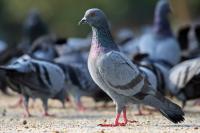-
Iran-Backed Iraqi militias pour into Aleppo, sparking fears of their use as a regional force
The recent influx of Iran-backed Iraqi Shiite militias into Syria has helped tilt the fight for Aleppo in favor of Syrian dictator Bashar al-Assad, and possibly portends the emergence of the militias as a larger, externally focused force throughout the Middle East. The growing prominence of Shiite militias has stoked fears among Sunni powers that Iran is creating a “Shiite Crescent” in order to bolster its influence across the Middle East.
-
-
Indian police arrest pigeon carrying threatening note against PM

The Indian police said they have taken a pigeon into custody after the bird was found carrying a threatening note against Prime Minister Narendra Modi. This is not the first time birds have become tools in the on-going skirmishes between the two countries. The Indian police, in 2015, captured and detained a pigeon on suspicion of spying for Pakistan. The bird was X-rayed to see whether it was carrying a spy camera, transmitter, or hidden chip. Two years earlier, in 2013, the Indian military found a dead falcon fitted with a small spy camera, and in 2010 the Indians detained another pigeon on suspicion of spying.
-
-
Comparing U.S. deaths from terrorism vs. gun violence
The number of Americans killed in acts of terrorism – both on U.S. soil and abroad — between 2001 and 2014 is 3,412 (including the victims of the 9/11 attacks). During the same period, 440,095 people died by firearms on U.S. soil (homicides, accidents, and suicides). In 2014, for every one American killed by an act of terrorism in the United States or abroad, 1,049 Americans died in the United States because of guns.
-
-
S&T selects RAND Corp. to operate new DHS research center

DHS has selected the RAND Corporation to operate the Homeland Security Operational Analysis Center (HSOAC), which will conduct technical and operational research and analysis to aid the department. The new center is a federally funded research and development center, and is funded under a five-year contract worth as much as $494.7 million.
-
-
Yahoo stealthily scanned customer e-mails on behalf of U.S. intelligence agencies

A report on Tuesday accuses Yahoo of secretly building a customized software program to search all of its customers’ incoming e-mails for specific information provided by the U.S. intelligence company. The company, complying with classified NSA and FBI directives, scanned hundreds of millions of Yahoo Mail accounts. Yahoo is the first U.S. Internet company to agree to such a blanket request.
-
-
Syrian rebel leader: Assad is the main enemy, not Israel
Mohammed Alloush, the leader of a coalition of Sunni rebels fighting against the regime of Syrian President Bashar al-Assad, said his group, which includes Islamists, has no desire to go to war with Israel. His attitude reflects the privately held positions of many Sunni Arab governments. Alloush’s statements also show that Israel has purchased some goodwill among the Syrian opposition. He told a Western reporter that Israel’s treatment of Syrians fighters and civilians who come to the border seeking medical attention is an important humanitarian gesture.
-
-
Why Colombia voted “no” to peace with FARC

It seemed like a done deal. After sixty years of fighting, three years of detailed negotiations, and a peace agreement signed in front of the head of the United Nations, the horrific conflict between the Colombian state and the Marxist Fuerzas Armadas de Colombia (FARC) finally seemed to be over. The peace process looked set to be a model for future negotiations around the world; all it needed was public approval. And then, in the referendum that was meant to finish the job, 50.24 percent of voters rejected the agreement – with fewer than 40 percent even showing up. It’s hard to know what happens next: more negotiations, another offer, reinvigorated conflict. The already weakened FARC might yet fragment, making another deal less robust; the government might shift back to the right, possibly heralding a return to a war fought through paramilitary proxies. Whatever happens, Colombia needs to find a way for all its people to discuss their own war – and their own peace – in a way that validates their experiences and does not escalate the violence further.
-
-
The 52-year war in Colombia: The numbers
The toll of the 52-year was in Colombia: 267,000 killed; 6.7 million people forcibly displaced; 46,386 victims of forced disappearance; 29,622 kidnapped; 8,022 children soldiers used both by FARC and right-wing paramilitary groups; 4,392 victims of extrajudicial execution by the government security forces
-
-
Russia’s ultimatum to US: Reduce commitment to NATO, lift sanctions – or nuclear deal is off
The Kremlin, in an unprecedented series of ultimatums on Monday, said Russia would suspend an agreement it had signed with the United States to turn weapons-grade plutonium into nuclear reactor fuel unless the United States rescinds the sanctions imposed on Russia because of its annexation of Crimea – and also cuts its military commitments to NATO. The Kremlin said that both the economic sanctions and the U.S. military commitments to its NATO allies are “unfriendly” acts to ward Russia.
-
-
ISIS regards battle for Dabiq as an apocalyptic showdown of Muslim and Christian armies
This may not be the end of the ISIS caliphate – which military experts say will occur sometime during the second half of 2017 – but the Islamist organization views the coming battle for the town of Dabiq in apocalyptic terms nonetheless. U.S.-backed Syrian opposition forces and Turkish military units are within forty-eight hours of reaching the ISIS-controlled Dabiq, which jihadists regard as the preordained site of the final apocalyptic battle between Muslims and Christians.
-
-
From 2012 to 2014, FBI submitted 561 Section215 applications: DOJ OIG
The Department of Justice (DOJ) Office of the Inspector General (OIG) last week released a June 2016 report examining the FBI’s use of the investigative authority granted by Section 215 of the Patriot Act between 2012 and 2014. The report notes that from 2012 through 2014 the DOJ, on behalf of the FBI, submitted 561 Section 215 applications to the FISA Court, all of which were approved.
-
-
DHS awards U Texas San Antonio $3 million to develop, deliver cybersecurity training
The Department of Homeland Security (DHS) has selected a team led by the University of Texas at San Antonio (UTSA) to develop and deliver cybersecurity training through the Continuing Training Grants (CTG) Program. The 2016 CTG is a $3 million grant to develop and deliver cybersecurity training to support the national preparedness goal to make the United States more secure and resilient.
-
-
Florida tightens public notification rules for pollution incidents
Last week Governor Rick Scott instructed Florida Department of Environmental Protection (DEP) Secretary Jon Steverson to issue an emergency rule that establishes new requirements for public notification of pollution incidents. The rule is to take effect immediately. Scott issued the instruction following the sewage spill in Pinellas County and the sinkhole at Mosaic’s New Wales facility.
-
-
Massive 2014 West Virginia chemical spill was preventable: CSB
The Chemical Safety Board’s (CSB) final report into the massive 2014 release by Freedom Industries of chemicals into the primary source of drinking water of Charleston, West Virginia, concludes that Freedom Industries failed to inspect or repair corroding tanks, and that as hazardous chemicals flowed into the Elk River, the water company and local authorities were unable effectively to communicate the looming risks to hundreds of thousands of affected residents, who were left without clean water for drinking, cooking, and bathing.
-
-
Europe facing “generation-long struggle” with returning battle-hardened jihadists

European security officials say that Europe faces a generation-long struggle to deal with thousands of battle-hardened Islamic jihadists returning as the ISIS caliphate starts to collapse. Experts say that he cumulative effects of the relentless military campaign by the U.S.-led coalition would finish off the so-called caliphate by the end of 2017 at the latest, if not sooner. The coalition’s military campaign has so far killed between 45,000 and 50,000 ISIS fighters, many of them foreigners, but an estimated 3,000 European fighters are still fighting in ISIS ranks. European security officials believe that the imminent fall of Mosul, Iraq’s second largest city, would signal the beginning of the end of the caliphate, resulting in many of the European ISIS fighters returning to their home countries.
-
More headlines
The long view
What Does Netflix’s Drama “Adolescence” Tell Us About Incels and the Manosphere?
While Netflix’s psychological crime drama ‘Adolescence’ is a work of fiction, its themes offer insight into the very real and troubling rise of the incel and manosphere culture online.
A Shining Star in a Contentious Legacy: Could Marty Makary Be the Saving Grace of a Divisive Presidency?
While much of the Trump administration has sparked controversy, the FDA’s consumer-first reforms may be remembered as its brightest legacy. From AI-driven drug reviews to bans on artificial dyes, the FDA’s agenda resonates with the public in ways few Trump-era policies have.
The Center Can Hold — States’ Rights and Local Privilege in a Climate of Federal Overreach
As American institutions weather the storms of executive disruption, legal ambiguity, and polarized governance, we must reexamine what it means for “the center” to hold.
How to Reverse Nation’s Declining Birth Rate
Health experts urge policies that buoy families: lower living costs, affordable childcare, help for older parents who want more kids
Foundation for U.S. Breakthroughs Feels Shakier to Researchers
With each dollar of its grants, the National Institutes of Health —the world’s largest funder of biomedical research —generates, on average, $2.56 worth of economic activity across all 50 states. NIH grants also support more than 400,000 U.S. jobs, and have been a central force in establishing the country’s dominance in medical research. Waves of funding cuts and grant terminations under the second Trump administration are a threat to the U.S. status as driver of scientific progress, and to the nation’s economy.
The True Cost of Abandoning Science
“We now face a choice: to remain at the vanguard of scientific inquiry through sound investment, or to cede our leadership and watch others answer the big questions that have confounded humanity for millennia —and reap the rewards.”
